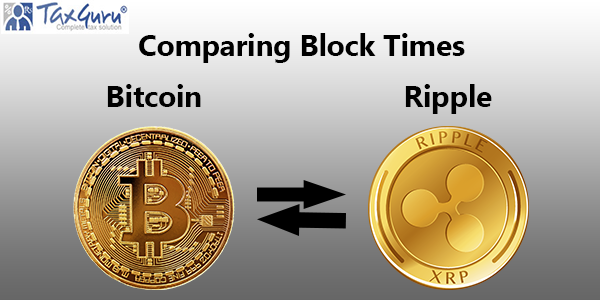#AD
Block times in cryptocurrencies, specifically Bitcoin and Ripple, greatly influence transaction experiences. While Bitcoin operates on a decentralized platform, Ripple’s streamlined approach offers rapid confirmations. With help of online trading platforms you may trade Bitcoin and other cryptocurrencies with assurance, knowing that your investments are safe and secure. If you are interested in oil trading then you can use the trading platforms like OilProfit
Side-by-side comparison of Bitcoin and Ripple block times
Bitcoin, often recognized as the pioneer cryptocurrency, operates on a decentralized platform where transactions are confirmed through a consensus mechanism known as Proof-of-Work (PoW). This system involves miners who compete to solve complex mathematical puzzles, and the first one to solve it gets to add a new block to the Bitcoin blockchain. As a result, the average time it takes to confirm a new block in the Bitcoin network is approximately 10 minutes.
However, this time can vary due to factors such as network congestion and the overall hashing power of the network. While a 10-minute block time provides a level of security against double-spending and potential attacks on the network, it might sometimes lead to longer waiting times for transaction confirmations, especially during peak periods.
In contrast, Ripple (often referred to by its native token name, XRP) utilizes a different consensus mechanism known as the Ripple Protocol Consensus Algorithm (RPCA). Instead of relying on competitive mining like Bitcoin, Ripple’s nodes validate transactions through a process of agreement. This process involves a set of trusted nodes that validate transactions, ensuring their authenticity and security.
Due to this streamlined approach, Ripple boasts a significantly faster block time, often ranging between 3 to 5 seconds. This rapid block time enables near-instantaneous transaction confirmations, making Ripple an attractive option for applications requiring quick cross-border transfers, like remittances or real-time gross settlement systems. However, critics argue that the reduced block time could compromise the level of decentralization, given that Ripple relies on a select group of validator nodes.
While Bitcoin provides a more decentralized but slower transaction confirmation system with its 10-minute block time, Ripple offers a much faster alternative with its few-seconds block time, albeit with a different approach to decentralization.

How this impacts user experience and transaction speed
In the realm of cryptocurrencies, block time plays a pivotal role in shaping user experience. For Bitcoin users, a block time of around 10 minutes means that a transaction, once initiated, will require an average of 10 minutes to gain a single confirmation. In practice, many platforms and vendors prefer multiple confirmations before considering a transaction secure, often leading to wait times of 30 minutes to an hour. This wait can be especially taxing when users are trying to make time-sensitive trades or purchases. The need to constantly check for transaction confirmations can make the Bitcoin experience less seamless for novice users or those used to instantaneous traditional digital transactions.
Ripple, on the other hand, with its block time of 3 to 5 seconds, translates to a vastly different user experience. Transactions on the Ripple network achieve confirmations in mere seconds. This speed can significantly enhance user confidence, especially in scenarios where swift transactions are essential, such as during currency exchanges or remittances. With Ripple, users can initiate and finalize transactions with the assurance of rapid completion, without the need to frequently check or wait for extended periods.
Transaction speed is intrinsically tied to block time. Bitcoin, with its longer block time, inherently has a slower transaction speed, especially during times of network congestion. As the Bitcoin network becomes busier, users might also opt to pay higher transaction fees to expedite their transactions, resulting in increased costs for the same transaction speed.
Conversely, Ripple’s architecture allows it to maintain consistent transaction speeds even during high traffic periods. Its 3 to 5 second block time ensures that transactions are processed and confirmed rapidly, irrespective of the network’s overall load. This consistent speed not only provides predictability for users but also makes Ripple an attractive choice for applications and systems that demand high-frequency, rapid transactions.
The block times of Bitcoin and Ripple have profound implications on both user experience and transaction speed. While Bitcoin provides the security of a pioneering decentralized system, its slower transaction times can be a deterrent for some users. Ripple’s quick transaction confirmations offer a different experience, geared towards those who prioritize speed.
Conclusion
The distinction in block times between Bitcoin and Ripple highlights the trade-offs between decentralization and speed, each catering to varied user priorities in the vast cryptocurrency landscape.
*****
Disclaimer: Crypto products and NFTs are unregulated and can be highly risky. There may be no regulatory recourse for any loss from such transactions. Cryptocurrency trading involves high risk, and is not suitable for all investors. Before deciding to trade cryptocurrencies, tokens or any other digital asset you should carefully consider your investment objectives, level of experience, and risk appetite. TaxGuru does not recommend that any cryptocurrency should be bought, sold, or held by you. Do conduct your own due diligence and consult your financial advisor before making any investment decisions. By the use of the above information, you agree that Author / TaxGuru is not responsible or liable in any manner for the authenticity, accuracy, completeness, errors or any kind of omissions in this piece of information for any action taken thereof.




